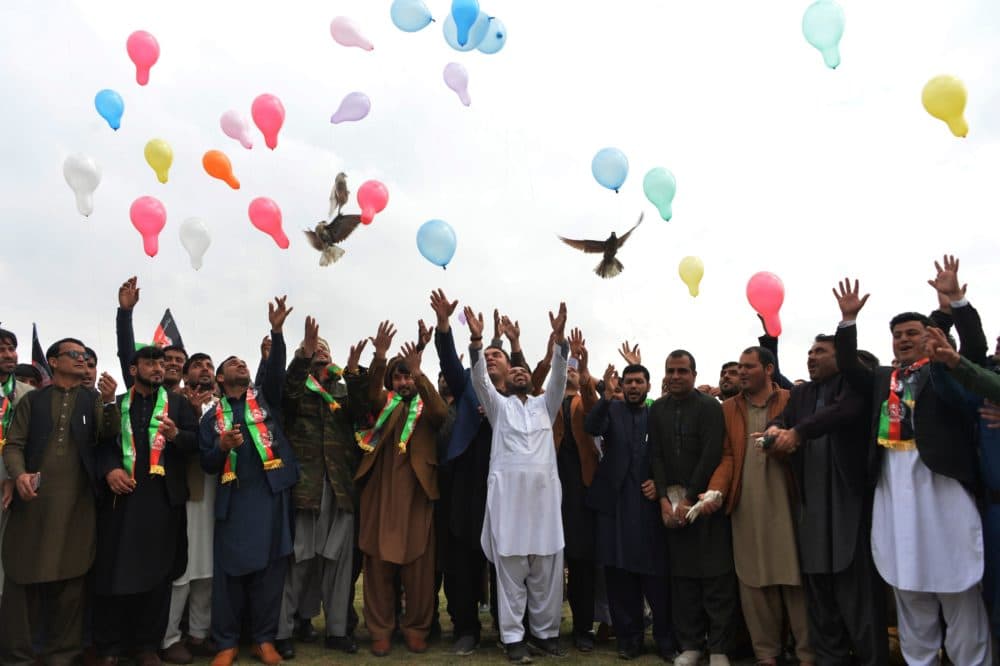Advertisement
The Prospect Of Peace In Afghanistan
Resume
The United States, the Taliban and the future of Afghanistan. Is the end of the endless war in sight? What are the prospects for a real peace?
Guests
James Dobbins, served in several State Department and White House posts, including U.S. ambassador to the European Union, assistant secretary of state for European affairs and special representative for Afghanistan and Pakistan, over the course of three presidential administrations — Obama, Bush and Clinton. Senior fellow and distinguished chair in Diplomacy and Security at the RAND Corporation. (@Jim_Dobbins)
Mariam Wardak, former official for the Afghan National Security Council. Anchor of "South Asia Diary with Mariam Wardak" on World is One News, an India-based news network. (@MaroWardak)
Michael Kugelman, deputy director and senior associate for South Asia at the Wilson Center. (@MichaelKugelman)
Jack Beatty, On Point news analyst. (@JackBeattyNPR)
Interview Highlights
On early American blunders that prolonged the war
Amb. James Dobbins: “I think in the first few months, we made three basic mistakes. One was to believe that a new, weak government with no army and no police force could be responsible for the security of its population and its territory. The second mistake was to not take advantage of outreach from senior Taliban leaders, including the top leadership, who were prepared to surrender. And the third was to not recognize that although Pakistan had ceased supporting the Taliban government, they hadn't stopped supporting the Taliban. The combination of those three failures took a long time to remedy. And by the time we did remedy, the Taliban had reorganized, re-equipped, refunded and resumed significant insurgency throughout Afghanistan.
“... In 2002, the U.S. was refusing to talk to the Taliban or even to to allow Taliban leadership that wanted to come over and surrender to do so. Those who did were sent to Guantanamo or to American-run prisons in Afghanistan for four years. Even Mullah Omar, the top Taliban leaders, offered to Karzai that he would surrender if he was offered immunity and the position of the Bush administration at the time persuaded Karzai to turn that down, although he was inclined to to agree. So that's a big change. That change occurred in 2010 under Obama when we decided we would talk to the Taliban.”
“This agreement is a milestone, but also it's a huge gamble because it appears to give the Taliban a lot without requiring much in return.”
Amb. James Dobbins
On the U.S.’s claim that war helped advance Afghan women’s rights
Mariam Wardack: “I think it's very generous that the world community in general is concerned for the women of Afghanistan. But I think that we also need to reflect that the world community did not know what was best for the Afghan women at the time when they entered Afghanistan. As an Afghan-American, I felt that I had a responsibility to show the best of both sides to both nations. When I was in Afghanistan for the past 10 years, I had to constantly explain to the Afghans that as an American, that Americans were not here to kill innocent Afghans, but to fight the spread of violent ideologies. In my time in Afghanistan, the people in the rural communities did not understand why foreign forces were in Afghanistan. It was not properly communicated to them. And that's why they focused so much more on Western ideologies being forced on the Afghan public, especially when it came to women's empowerment.”
“The Western ideology of empowerment cannot be accepted in Afghanistan if it has not been accepted in the region. Currently, if you look at the region, we have issues of a gender gap within Pakistan, India, Iran. So how can we go into Afghanistan, which is a much smaller nation and less established, but all of a sudden want to provide all these rights and not even explain to the women what their rights are?"
On the achievement, and risk, of the peace agreement
Michael Kugelman: "What happened on Saturday, the deal between the U.S. and the Taliban, it really is a milestone because it really is the first formal type of agreement or deal that the Taliban has signed with anyone, particularly the United States. And at the end of the day, it puts Afghanistan on a potential path to launching a peace process. And I emphasize potential for all the reasons that we heard from Ambassador Dobbins earlier: there is a lot of obstacles. And I think that for me, what really stands out about this agreement is a milestone, but also it's a huge gamble because it appears to give the Taliban a lot without requiring much in return. I mean,the agreement says that in just a few months several thousand U.S. troops will leave with no conditions. There's supposed to be a release of 5000 Taliban prisoners in a few days. There are going to be efforts to try to get the Taliban off U.N. sanctions list by the end of May. And in return, what do we have the Taliban agree to do? Sever ties with international terrorists, and in ways that are not are laid out in the agreement, but in somewhat of a vague way and without any clear indication of how efforts by the Taliban to sever those ties with international terrorists will actually be monitored and enforced."
“I think it's very generous that the world community in general is concerned for the women of Afghanistan. But I think that we also need to reflect that the world community did not know what was best for the Afghan women at the time."
Mariam Wardack
From The Reading List
Al Jazeera: "In Afghanistan, peace is finally in sight" — "Last Friday, a week-long 'reduction in violence' took effect across Afghanistan as a result of extensive negotiations between the United States and the Taliban.
"This 'reduction in violence,' if successful, will be followed by the signing of an agreement between the two parties on February 29, in which the US will announce a withdrawal schedule for its troops in exchange for guarantees from the Taliban that it will no longer allow Afghan territory to be used as a launchpad for attacks that threaten global security.
"If and when such an agreement is reached, Afghanistan can finally enter the crucial phase of intra-Afghan negotiations and take steps towards agreeing on a political settlement that would end the country's decades-long conflict for good. This process, however, is not going to be easy."
The New York Times: "After 18 Years, Is This Afghan Peace, or Just a Way Out?" — "President Trump has left no doubt that his first priority in Afghanistan is a peace treaty that would enable him to claim that he is fulfilling his vow to withdraw American troops.
"But a parade of his former national security aides say he is far less interested in an actual Afghan peace.
"And that creates an enormous risk for Mr. Trump and for Afghanistan: that, like President Richard M. Nixon’s peace deal with North Vietnam in January 1973, the accord signed Saturday will speed an American exit and do little to stabilize an allied government. In the case of Vietnam, it took two years for the 'decent interval,' in Henry A. Kissinger’s famous phrase, to expire and for the South Vietnamese government to be overrun."
The New York Times: "They Killed Their Husbands. Now in Prison, They Feel Free." — "The 15-foot walls that surround the Herat Women’s Prison are common to government properties in Afghanistan, as is the corrugated-metal gate, which is guarded by security personnel day and night. The concertina wire that encircles the walls gives the compound a cagelike feeling, but the barriers are meant to keep intruders from getting in as much as they are intended to keep inmates from getting out.
"One hundred nineteen inmates and their 32 children live behind the robin’s-egg blue walls of the prison, located in the northeast sector of Herat city in western Afghanistan, just off the main road. First opened in the 1990s, before the Taliban took power, the facility is now run by the provincial government with some support from local nongovernmental organizations.
"At least half the women in Afghan prisons have been charged with so-called moral crimes like drug use, running away from home and sex outside of marriage — including in the case of rape, evidence of which may be uncovered through forced virginity tests. Despite pressure from Western governments and human rights groups to change these laws, such offenses continue to be recognized as serious crimes under Afghanistan’s Constitution."
AP: "Afghans view US-Taliban deal with well-earned skepticism" — "Many Afghans view Saturday’s expected signing of a U.S.-Taliban peace deal with a heavy dose of well-earned skepticism. They’ve spent decades living in a country at war — some their whole lives — and wonder if they can ever reach a state of peace.
"The deal expected to be signed in Doha, Qatar is meant to set the stage for a U.S. troop withdrawal and to usher in talks among Afghans on both sides of the conflict about their country’s future. There’s been bitter squabbling among political leaders, concern of a temporary truce being undermined, and the challenge of uniting a fractured country remains daunting.
"Also on Saturday, but in the Afghan capital Kabul, U.S. Defense Secretary Mark Esper and NATO Secretary General Jens Stoltenberg will sign a declaration 'recommitting the international community’s commitment to Afghanistan,' said Sediq Sediqqui, spokesman for Afghanistan’s President Ashraf Ghani."
This program aired on March 2, 2020.

